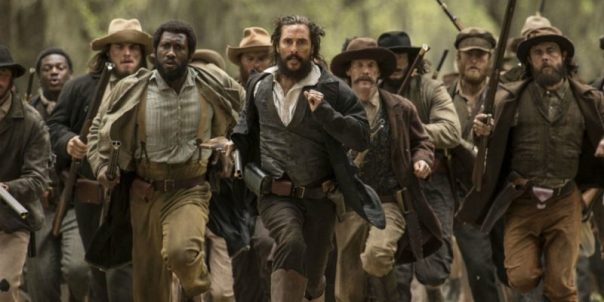Aiming for Accuracy: Free State of Jones, Contingency, and the Meaning of Freedom
Early in Free State of Jones a Confederate soldier proclaims he is not fighting for slavery but rather “for honor.” His comrades, including poor Mississippi farmer Newton Knight (Matthew McConaughey), needle him. Considering the “Twenty Negro Law,” Conscription Act, and tax-in-kind law, they point out that their blood only helps slaveholders get richer. After deserting, Knight leads poor farmers and former slaves against conscription, taxation, and re-enslavement. Against a shared enemy, the Confederacy, he brings black and white fugitives together. But when Knight and his black comrades-in-arms attempt to move from the bullet to the ballot box, white allies fade away and white supremacists rise up.

Beginning at the Battle of Corinth in 1862, Free State of Jones is about a long Reconstruction. It uniquely explores African Americans’ struggle for political and economic rights in the face of white power. Here, emancipation has an asterisk. Slavery ends with the war, but freedom does not follow. After former Confederates return to power and reassert slavery’s white hierarchy, political organizer and ex-slave Moses (Mahershala Ali) captures the reality for black Americans: “We free and we ain’t free.” Unlike other films, Free State of Jones illuminates the contingency of black freedom in the South after the Civil War in the face of white supremacist violence, northern Republican abandonment, and insufficient federal troops. After the battle scenes, the Federal troops are entirely absent.
Throughout the film, class, race, and gender overlap and challenge the assumptions of viewers and characters. Women and men, black and white, resist, fight, and survive together. When a white member of Knight’s company tries to deny Moses food because he is black and a fugitive, Moses responds, “How you ain’t?” How, if both are fugitives from compulsory service to slaveholders in a cotton field or on a battlefield, are they different? Through spirituality and experience, Knight considers this equality of the oppressed to be self-evident. McConaughey’s portrayal of Knight suggests Nathaniel Bacon and John Brown: a natural leader wild-eyed for solidarity and justice in the face of economic and racial oppression. Director Gary Ross highlights the many methods of resistance employed by fugitive slaves and enslaved people: fleeing to the wilderness, like Moses; remaining on plantations but assisting runaways, like Rachel (Gugu-Mbatha-Raw); remembering, like Moses’ wife (Kesha Bullard Lewis) and son Isaiah (LaJessie Smith). White characters resist Confederate authority similarly, but Ross also delineates the differences in experience. Rachel’s and Moses’s bodies bear witness to their physical and psychological torture, scars that mark the limits of white abilities to fathom black experiences.

Committed to historical authenticity, Ross consulted historians Martha Hodes, Eric Foner, Margaret Storey, and Victoria Bynum, whose book 2001 The Free State of Jones was optioned for the screen. He also published extensive footnotes for the film that are available online, perhaps unprecedented in Hollywood. Does it suggest a trend towards fact over fiction in historical movies? Only the box office will tell.

Free State of Jones stands out for exploring Reconstruction, but it is not perfect. Few characters are developed beyond Knight. This is a missed opportunity considering the depth Mbatha-Raw and Ali bring to Rachel and Moses, respectively, and the reality that, while Knight leads, he joins a preexisting fugitive slave network. The story of the 1948 Mississippi miscegenation trial of Knight’s great-grandson Davis Knight is all elbows. The pacing disorients, but while this hurts the narrative it strengthens the history. Familiar Civil War and Reconstruction benchmarks are absent, leaving audiences open to surprise when scenes or subtitles challenge assumptions. In one scene, dozens of African Americans pick cotton in a field under the supervision of white overseers when the words “One year after emancipation” appear as a subtitle. “What changed? What was freedom?” perplexed viewers may ask. An apt question, then and now. In Reconstruction, conditions changed both essentially and unnoticably, quickly and slowly, permanently and temporarily. The film unintentionally mimics this.
Free State of Jones emphasizes the inherent inequality of the Confederacy, the violence of white supremacists, and the broken promises of Reconstruction at a poignant moment in our national discourse. Many will find the ending unsatisfying, abrupt, and unfinished. But maybe historicity should get in the way of a happy ending, especially when it reminds us that racial injustice today has deep roots in America’s slaveholding past. “The arc of the moral universe is long,” Martin Luther King, Jr. said, “but it bends towards justice.” By bringing one story of Reconstruction to the silver screen, maybe Free State of Jones will recruit a few more hands to reshape a more just ending to this American tale.

Tom Foley
Tom Foley is a graduate student at Georgetown University. He can be reached at tfoley2@gmail.com.
2 Replies to “Aiming for Accuracy: Free State of Jones, Contingency, and the Meaning of Freedom”
Rant Alert: Ironically, I had high hopes for Oprah Winfrey’s OWN. I really thought she would take this network into the hearts and minds of people world wide. I really believed she would bring together young, gifted and Black and Brown writers, actors, artists, producers, directors, play-writers. I envisioned OWN would become the new Black-American-Cinematique of the 21st century. I thought Oprah would stand-up for film negre-noir in colorful glory. Maybe, one day soon, she will replace Tyler Perry POV or require he update his POV. The African-American historical whitewashed revisions must bridge the past re-written in truth by those who lived it as a flashback to future.
If not Oprah than who. Someone should.